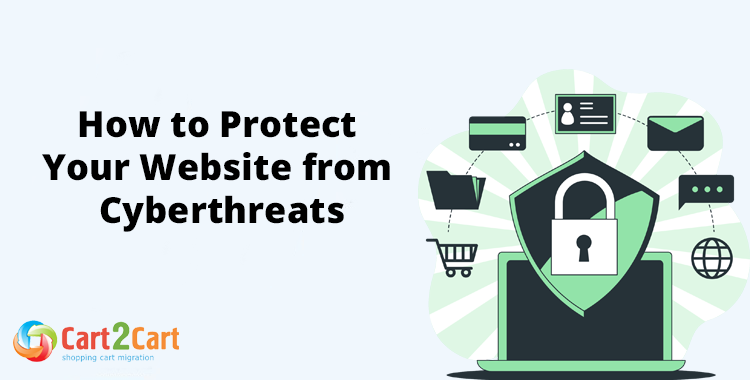In general, more than 2,200 cyberattacks are reported every day. That’s one security breach every 39 seconds, on average. eCommerce stores are the most targeted websites, given the sensitive nature of the information exchanged on these platforms.
Unfortunately, the threat of hackers isn't going anywhere anytime soon. The only thing you can do to protect your store and customers is ramp up your website security. This guide dives deep into the basics of Wix security to help you protect your store from cyber threats.
The Importance of Wix Store Security
eCommerce store security is important for several reasons:
- Customer data protection: A security breach in your store may result in hackers stealing sensitive customer information, including names, credit card and social security numbers, residential addresses, etc., all of which can be used to perpetrate fraud, identity theft, and other criminal dealings.
- Brand reputation: If existing and prospective customers catch wind of your online store falling victim to a cyberattack, it will inevitably erode their trust in your business. Once this happens, it is often difficult (if not impossible) to rebuild your brand reputation in the wake of a security breach.
- Protection against financial losses: A site security breach can have far-reaching financial consequences. Business owners must factor in the cost of resolving the attack, compensating affected customers for any losses incurred, and paying the fines imposed by regulatory authorities.
- Prevention of malware propagation to other systems: If your eCommerce site is hacked, attackers may use it as a gateway to access other computer systems, databases, and servers under your control and infect them with malware. This could bring your day-to-day operations to a grinding halt and result in financial losses on a wider scale.
Implementing foolproof Wix security strategies in your online store stops hackers in their tracks, allowing you to side-step the legal and financial ramifications breaches of this nature may have on your business.
See also: Wix eCommerce Review: Should You Use It for Your Online Store?
Understanding the Risks and Consequences of Inadequate Security
eCommerce websites face a host of cybersecurity threats. If they materialize, these threats can severely affect online businesses and users. Here are some of the most common risks inadequate cybersecurity poses to online store owners.
1. Cross-Site Scripting (XSS)
Cross-site scripting attacks occur when hackers inject malicious javascript code into users’ browsers through trusted websites. XSS attacks are similar to SQL injections and prey on browsers’ inability to differentiate between harmless and malicious markup text. Browsers are built to render any text input they receive, regardless of its intent.
XSS works by accessing and stealing a site visitor’s information stored in their browser (also known as “cookies”) and then using it to impersonate them online. Cookies can include anything from site login credentials such as usernames and passwords to sensitive financial details such as credit card numbers and banking data.
2. Distributed Denial of Service (DDoS) Attacks
DDoS attacks occur when hackers direct massive amounts of traffic to the server hosting a store, causing the website to crash. The goal of overloading the server is to interrupt your store’s functionality, taking it offline, therefore making it impossible for customers to browse, view, or purchase anything from the website.
3. Search Query Language (SQL) Injections
SQL injections occur when hackers insert malicious code into a web page's input field to access the underlying database. If successful, hackers can extract sensitive customer data such as usernames, passwords, credit card information, work and residential addresses, and other confidential details.
4. Ransomware
Ransomware is one of several types of malicious software (malware) used by hackers to encrypt the files in a website to demand a ransom from the store owner to decrypt them. Once the site owner pays the ransom, the hacker decrypts the affected files and removes the ransomware. However, there’s no guarantee that the attacker will hold up their end of the bargain. There’s always the chance they may take the money and run.
5. Login Credential Reuse
If a hacker gains access to and steals your user credentials, the consequences can be disastrous for your online store and any other website you own that uses the same credentials. Since users tend to recycle the same usernames and passwords across multiple online platforms, it comes as no surprise that credential reuse is one of the most prevalent threats to cybersecurity.
6. Payment Fraud
Hackers deploy various tactics to perpetrate payment fraud on eCommerce sites. For instance, they may use stolen credit card numbers to make purchases on your online store. They may also use phishing schemes or stolen passwords to access customers’ accounts. Once they do, they may modify the existing account details to make fraudulent purchases.
Effects of Inadequate Security
Website security breaches can have lasting effects on your store’s performance. In the short term, you might notice a significant decline in your traffic and conversion rates. In the long term, it can lead to irreversible damage to your business reputation and brand identity. Here are three of the most common consequences of inadequate store security.
1. High Customer Churn Rate
The churn rate represents the number of subscribers or customers who don't renew their subscriptions or make repeat purchases on your website over a specific period (month, quarter, year, etc.). It is obtained by calculating the percentage of lost customers over the total number of customers present at the beginning of the period under review.
The goal of any business owner should be to maintain low customer churn. 2% to 8% is generally considered an acceptable churn rate.
If a security breach in your online store results in losing sensitive customer information, it will undoubtedly change how the public perceives your website and brand. People will be less likely to make repeat purchases on your online store in the future.
2. Search Engine Blacklisting
If Google bots crawl your eCommerce website and encounter malicious code embedded within it, it might result in the blacklisting of your website. When your site is blacklisted, your online store won't appear on search engine results pages (SERPs), which can negatively impact your sales.
3. Website Suspension
A security breach on your Wix store can prevent customers from accessing critical site services, including registrations, login, and shopping. The unavailability of these services can make it impossible for site visitors to interact with your store for the duration your services are down and for the period it takes to fix the issue and get back online again. The result would be a massive decline in sales.
Is Your Wix Store Secure?
How can you tell whether your Wix eCommerce website is safe from potential security breaches? The checklist below should help.
- Have I implemented password best practices, including making it a requirement for anyone accessing my website to have strong passwords?
- Does my online store have HTTPS implemented?
- What criteria have I used to assign user roles, particularly when it comes to admin rights?
- Is my online store PCI DSS compliant?
- Are the plugins and apps installed on my website secure and up-to-date?
- Is my website backed up regularly? Is the backup process manual or automatic?
- What level of security and data privacy does my eCommerce platform offer? Does it continuously monitor my site for suspicious activity and attempted breaches?
See also: Wix vs. Shopify: Which Is Better for Your Online Store?
Wix Security Best Practices to Protect Your Store
Here’s a run-through of the seven steps every online store owner must take to prevent potential security breaches.
1. Promote Complex Passwords
It is not unusual for site visitors to recycle the same username and password they’ve used on other websites. If you require customers to create accounts on your website, particularly if you offer subscription services or loyalty programs, ensure you make it a requirement for them to create strong, hard-to-guess passwords.
To do this, you must set specific criteria for complex passwords, such as requiring a certain number of characters long, having uppercase and lowercase letters, having numbers, and having at least one symbol. This requirement also extends to you and members of your staff. Your domain registrar, hosting, payment processors, and Wix accounts should all have complex hard passwords with 2-step verification enabled. Prompt users to change their passwords often.
2. Implement HTTPS
SSL (Secure Sockets Layer) refers to data encryption technology that protects information transmitted over the web. SSL-certified websites have "HTTPS" displayed at the beginning of the URL.
Store owners handle sensitive customer data, which can have serious financial and legal repercussions in the event of a breach. For this reason, you must ensure your Wix store is SSL-certified to encrypt all the data being transmitted between browsers. That way, hackers have no way of intercepting it. All Wix websites come with a free SSL certificate.
3. Maintain a Tight Grip on Store Admin Rights
As your business scales, so will your team. It inevitably means having more people working on your website. For this reason, the admin rights to your online store should be handed out sparingly and only to the team members who need them to perform their duties effectively. Having several people with admin rights increases your website’s vulnerability to security breaches.
It would also be prudent to create a security policy for store admins to follow. The policy should provide guidelines on how to create and choose strong usernames and passwords, how to detect phishing attempts on the store, how often passwords should be changed, etc. Consider regularly training your team on security threats to safeguard your Wix site.
4. Never Hoard Customer Data
Like many online store owners, you might be tempted to collect and store critical information on your customers and site visitors. This practice presents a serious risk to your business and, by extension, your customers in the event of a security breach.
As a rule, only collect data necessary for the completion of a transaction. You should also never store users’ credit or debit card details on your servers. It would not only pose a huge risk to your business, but you would also be operating in contravention of the PCI DSS (Payment Card Industry Data Security Standards) policies, which online store owners must comply with. By default, Wix websites are Level-1 PCI DSS compliant.
5. Audit Third-Party Plugins and Apps
Always endeavor to practice good plugin hygiene. It involves carrying out regular audits of your apps and third-party plugins. Check what permissions you have granted to these plugins, confirm that you still need these apps and are using them, and ensure you trust them with your site data.
Don’t rack up an unnecessary number of plugins, and restrict the number of entities with access to your store’s and users’ data. That way, you minimize your site’s exposure to potential threats, which may result from existing or emerging security vulnerabilities in the plugin or app.
6. Back Up Your Website Frequently
Despite your best efforts to secure your site, a breach may occur. To avoid losing critical data and having to start again from scratch, always create regular backups of your site. That way, you can restore all your store data and configurations to their original, uncorrupted versions.
Most eCommerce platforms, including Wix, automatically create site backups of your online store. Additionally, you should create a second backup of your site and store it off-platform. You can never go wrong with having multiple backups.
7. Pick Your Shopping Cart Provider Wisely
The eCommerce platform you pick to host your online store is your first line of defense against potential security threats. A solid shopping cart provider should, at the bare minimum, provide a secure framework backed by dedicated security professionals.
Wix is a top choice for online store owners for several reasons, the main one being that it checks all the boxes when it comes to its enterprise-grade security capabilities. The Wix team conducts a series of penetration tests, code reviews, and threat modeling procedures, all of which are designed to anticipate and prevent cyberattacks.
Wix partners also undergo mandatory assessments to ensure they maintain a high level of security and privacy, both of which are critical to the operation of any online store. The platform’s dedicated incident response team exists to swiftly respond to emerging cyber threats to keep your business functioning regardless of the situation.
See also: Challenges Associated With Wix Migration and How to Overcome Them.
Final Thoughts
Cyberattacks get more sophisticated by the day, making eCommerce sites more vulnerable to security breaches. Understanding the steps you must take to secure your online store against these threats is the key to protecting business-critical data and customer privacy. The Wix security measures detailed in this guide will help point you in the right direction to keep your online store safe from cyber attackers.
Are you thinking of switching from your existing shopping cart provider to Wix? Cart2Cart can help you do just that. This automated shopping cart migration tool takes the uncertainty out of the replatforming process to migrate your online store safely and seamlessly with no downtime or data loss.
Want to see it in action? Sign up to Cart2Cart today for a free demo.
FAQs
How do I make my Wix site secure?
Some foolproof steps you can take to secure your eCommerce store include:
- Promoting password best practices among all site users;
- Implementing HTTPS and SSL protocols;
- Maintaining a tight grip on store admin rights;
- Not hoarding customer data;
- Regularly auditing and updating third-party plugins and apps;
- Doing regular site backups;
- Picking a shopping cart provider with a robust security framework.
My Wix website says Not Secure – Why?
If the address bar on your Wix site displays a red warning that reads “Not Secure,” it is because your online store doesn’t have an SSL certificate. An SSL certificate encrypts the information being exchanged between your store and browsers, creating a secure connection that prevents hackers from accessing sensitive customer information, such as credit card details. Once you do, the – Wix site not secure – error will resolve.
How do I restrict access to my Wix website?
The best way to restrict access to your eCommerce site would be to hand out admin rights sparingly and only to the specific team members who need them to perform their duties effectively. You do this by creating member roles and making specific permissions accessible to the members of that group.
Is Wix safe from hackers?
The truth is, no online store is 100% “safe” from hackers. Cybercriminals work tirelessly to uncover new ways to infiltrate websites. The great thing about Wix is that it integrates a wide range of enterprise-grade security features built to anticipate, prevent, and eradicate cyberattacks.
The team conducts regular penetration tests, code reviews, 24/7 monitoring, and threat modeling procedures on the platform to ensure it is well-equipped to deal with emerging cyber threats swiftly and conclusively.
How do you make your Wix website secure?
Here is a checklist you can use to ensure your Wix eCommerce website is secure to keep threat actors at bay:
- Have I made it a requirement for anyone accessing my website to have strong passwords?
- Does my online store have HTTPS implemented?
- What criteria have I used to assign user roles, particularly when it comes to admin rights?
- Is my online store PCI DSS compliant?
- Are the plugins and apps installed on my site secure and up-to-date?
- Is my website backed up regularly?
- What level of security and data privacy does my eCommerce platform offer? Does it continuously monitor my site for suspicious activity and attempted breaches?






 March 31, 2025
March 31, 2025 


